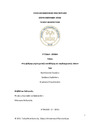| heal.creatorName | Γεωργίου, Χριστόφορος | el |
| heal.creatorName | Σερζετάκης, Βασίλειος | el |
| heal.creatorName | Σταυρόπουλος, Δημήτριος | el |
| heal.creatorName | Georgiou, Christoforos | en |
| heal.creatorName | Serzetakis, Vasileios | en |
| heal.creatorName | Stavropoulos, Dimitrios | en |
| heal.publicationDate | 2021-09-22 | |
| heal.identifier.primary | http://hdl.handle.net/20.500.12688/10037 | |
| heal.abstract | Εισαγωγή: Η νοσηρότητα και η θνησιμότητα των καρδιαγγειακών παθήσεων (CVD) είναι εξαιρετικά υψηλή παγκοσμίως. Η καταθλιπτική ασθένεια είναι μια σοβαρή ψυχιατρική διαταραχή που πλήττει σημαντικό μέρος του πληθυσμού σε όλες τις χώρες. Πολλές επιδημιολογικές μελέτες έχουν επιβεβαιώσει ότι υπάρχει υψηλή συννοσηρότητα μεταξύ αυτών των δύο καταστάσεων Σκοπός: H παρούσα βιβλιογραφική ανασκόπηση αναδεικνύει την αμφίδρομη σχέση μεταξύ καρδιαγγειακής νόσου και μείζονος κατάθλιψης. Ειδικότερα, εξετάζεται το ενδεχόμενο εμφάνισης καρδιαγγειακού νοσήματος σε ασθενείς που έχουν διαγνωστεί με χρόνια κατάθλιψη, καθώς και την εμφάνιση μείζονος κατάθλιψης σε ασθενείς με καρδιαγγειακή νόσο Μεθοδολογία: Πραγματοποιήθηκε βιβλιογραφική ανασκόπηση σε διάρκεια 6 μηνών , διερευνήθηκαν τα αποτελέσματα από τις εξειδικευμένες αναζητήσεις στην βάση δεδομένων PubMed, με τις λέξεις κλειδιά που αναφέρονται παρακάτω. Κατασκευάστηκε διάγραμμα ροής Prisma όπου περιγράφει αναλυτικά την διαδικασία επιλογής μελετών, ιδανικών για την εργασία. Αποτελέσματα: Τα αποτελέσματα της εργασίας έδειξαν ότι : Η κατάθλιψη αυξάνει τον κίνδυνο καρδιακής θνησιμότητας σε άτομα με (RR 1.6 για MID και 3.0 για MAD) και χωρίς (RR 1.5 για MID and 3.9 για MAD) CAD στην αρχή. Επίσης, Βρέθηκε ισχυρή θετική σχέση μεταξύ CVD και κατάθλιψης (RR: 3.60 [95% διάστημα εμπιστοσύνης (Cl): 3.30 , 3.92). Αξίζει να σημειωθεί ότι , Σημαντικά αυξημένος κίνδυνος για ΜΙ βρέθηκε μεταξύ των ατόμων που νοσηλεύονταν για κατάθλιψη(RR, 2.3). Συμπεράσματα: Έχει διαπιστωθεί ότι τα υγιή άτομα με κατάθλιψη έχουν τουλάχιστον διπλάσιο κίνδυνο εμφάνισης CVD. Μετά από έμφραγμα μυοκαρδίου η εμφάνιση κλινικής κατάθλιψης ενέχει αυξημένο κίνδυνο νοσηρότητας και θνησιμότητας. Για να κατανοήσουμε τους πολύπλοκους μηχανισμούς που ευθύνονται για αυτή τη συννοσηρότητα έχουν ληφθεί υπόψη διάφοροι παράγοντες. | el |
| heal.abstract | Introduction: The morbidity and mortality of cardiovascular diseases (CVD) is extremely high worldwide. Depression is a serious psychiatric disorder that affects a significant portion of the population in all countries. Numerous epidemiological studies have confirmed that there is a high comorbidity between these two conditions. Aim: Present literature highlights the two-way relationship between cardiovascular disease and major depression. In particular, the possibility of cardiovascular disease in patients diagnosed with chronic depression is examined, as well as the occurrence of major depression in patients with cardiovascular disease. Methods/Design: A literature review was conducted over a period of 6 months, the results of the specialized searches in the PubMed database were analyzed, with the keywords listed below. A Prisma flowchart was developed where it describes in detail the process of selecting studies, ideal for the job. Results: The results of the study showed that: Depression increases the risk of cardiac mortality in people with (RR 1.6 for MID and 3.0 for MAD) and without (RR 1.5 for MID and 3.9 for MAD) CAD in the beginning. Also, a strong positive correlation was found between CVD and depression (RR: 3.60 [95% confidence interval (Cl): 3.30, 3.92). It is worth noting that, Significantly increased risk for MI was found among patients treated for depression (RR, 2.3). Conclusion: It has been found that healthy people with depression are at least twice as likely to develop CVD. Following a myocardial infarction, the onset of clinical depression carries an increased risk of morbidity and mortality. In order to understand the complex mechanisms responsible for this comorbidity, various factors have been taken into account. | en |
| heal.language | Ελληνικά | el |
| heal.language | Greek | en |
| heal.academicPublisher | ΕΛ.ΜΕ.ΠΑ., ΣΧΟΛΗ ΕΠΙΣΤΗΜΩΝ ΥΓΕΙΑΣ (ΣΕΥ), Τμήμα Νοσηλευτικής | el |
| heal.academicPublisher | Η.Μ.U, School of Health Sciences (SHS), Nursing Dept. | en |
| heal.title | Η αμφίδρομη σχέση μεταξύ κατάθλιψης και καρδιαγγειακής νόσου. | el |
| heal.title | Cardiovascular disease and depression: a bidirectional relationship. | en |
| heal.type | Πτυχιακή Εργασία | el |
| heal.type | Bachelor thesis | en |
| heal.keyword | καρδιαγγειακή νόσος, κατάθλιψη, έμφραγμα μυοκαρδίου, στεφανιαία νόσος | el |
| heal.keyword | cardiovascular disease, depression, myocardial infarction, coronary heart disease | en |
| heal.access | free | el |
| heal.advisorName | Ζωγραφάκης-Σφακιανάκης, Μιχαήλ | el |
| heal.advisorName | Zografakis-Sfakianakis, Michail | en |
| heal.academicPublisherID | ΕΛ.ΜΕ.ΠΑ. Ελληνικό Μεσογειακό Πανεπιστήμιο | el |
| heal.academicPublisherID | Η.Μ.U Hellenic Mediterranean University | en |
| heal.fullTextAvailability | true | el |
| tcd.distinguished | false | el |
| tcd.survey | false | el |


